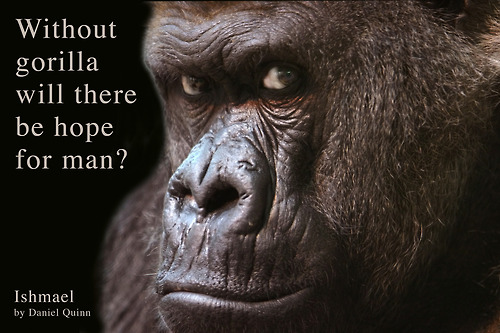I am going to admit that I have finished the entire book already so my posts might be a little off-kilter with what I am writing about. What can I say, when a book grabs me it takes me all the way. I am so very fond of this book, I would recommend it to anyone. Correction, I will recommend it to everyone. Simply put, this book clearly guides us to the knowledge of how we came to be, rather, how we came to be so messed up.
Concerning these chapters in particular, I really enjoyed the beginning of chapter three when Ishmael explains that "No creation story is a myth to the people who tell it. It's just
the story." and then he goes on to tell him the story of the first being that found land and how they thought. Because the creature could only speak about what they knew, that is what was their truth. They didn't know what they didn't know, and that rule applies just the same to humans.

The creature believes they are the most intelligent being there ever was and this is where it stops because everything was leading up to their existence. After this story was told Ishmael explains it to the narrator, "the pinnacle was reached in man. Man is the climax of the whole cosmic drama of creation." This part struck me, that is exactly how we think, the takers that is. Pardon all my quotes but they are so good, "the Takers regard the world as a sort of human life-support system, as a machine designed to produce and sustain human life." We believe that the world was made for us, the entire universe, everything. We are at its core and therefore it is ours to explore or exploit or concur.
Humans think that we are this special gift to Earth, to finish what the gods tried to do but failed to do. Ishmael says "without man, the world was unfinished, was just nature, red in tooth and claw. It was in chaos, in a state of primeval anarchy." We obviously need to fix this, or so Mother Culture tells us. At the end of chapter four Ishmael says that when we split from the Leavers we had to choose "a brief life of glory or a long, uneventful life in obscurity." We chose the former and we are still enacting that story, the story that has us as the enemies of the Earth.
This book is a gift, quite similar to a bible or other divine-influenced works. It is not much a book of fiction but more a guide to an idea, a true one nonetheless. This book gets at exactly what must be done in order for us to keep the Earth, not our Earth, alive. No spoilers but I did do a bit of crying towards the end of this book, quite a relief it gave me.
An interesting Ishmael community? I suggest we all go on after this and read The Story of B and his other works, he is currently working on a book right now that he says might be his most important.
Daniel Quinns: Meaning of Life
 A lot of times I want to give everything up in our society but then I still have this irrational fear about living in the "wild." It is because Mother Culture tells us that the Leaver lifestyle is like a dream or nightmare, "a man is scrabbling along a ridge at twilight.. The man is short, thin, dark, and naked. He's running in a half crouch, looking for tracks. He's hunting, and he's desperate. Night is falling and he's got nothing to eat...[he is on a treadmill] because tomorrow at twilight he'll be there running still-or running again..." The book goes on explaining how frightful this life seems to us but in reality it is such a free life to live.
A lot of times I want to give everything up in our society but then I still have this irrational fear about living in the "wild." It is because Mother Culture tells us that the Leaver lifestyle is like a dream or nightmare, "a man is scrabbling along a ridge at twilight.. The man is short, thin, dark, and naked. He's running in a half crouch, looking for tracks. He's hunting, and he's desperate. Night is falling and he's got nothing to eat...[he is on a treadmill] because tomorrow at twilight he'll be there running still-or running again..." The book goes on explaining how frightful this life seems to us but in reality it is such a free life to live.

